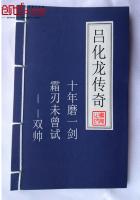Again they looked at each other.She suddenly sprang up, turned her back to him, and walked away.He too rose slowly and went to the water's edge, where, crouching, he began to amuse himself unconsciously.Picking a daisy he dropped it on the pond, so that the stem was a keel, the flower floated like a little water lily, staring with its open face up to the sky.It turned slowly round, in a slow, slow Dervish dance, as it veered away.
He watched it, then dropped another daisy into the water, and after that another, and sat watching them with bright, absolved eyes, crouching near on the bank.Ursula turned to look.A strange feeling possessed her, as if something were taking place.But it was all intangible.And some sort of control was being put on her.She could not know.She could only watch the brilliant little discs of the daisies veering slowly in travel on the dark, lustrous water.The little flotilla was drifting into the light, a company of white specks in the distance.
`Do let us go to the shore, to follow them,' she said, afraid of being any longer imprisoned on the island.And they pushed off in the punt.
She was glad to be on the free land again.She went along the bank towards the sluice.The daisies were scattered broadcast on the pond, tiny radiant things, like an exaltation, points of exaltation here and there.Why did they move her so strongly and mystically?
`Look,' he said, `your boat of purple paper is escorting them, and they are a convoy of rafts.'
Some of the daisies came slowly towards her, hesitating, making a shy bright little cotillion on the dark clear water.Their gay bright candour moved her so much as they came near, that she was almost in tears.
`Why are they so lovely,' she cried.`Why do I think them so lovely?'
`They are nice flowers,' he said, her emotional tones putting a constraint on him.
`You know that a daisy is a company of florets, a concourse, become individual.Don't the botanists put it highest in the line of development?
I believe they do.'
`The compositae, yes, I think so,' said Ursula, who was never very sure of anything.Things she knew perfectly well, at one moment, seemed to become doubtful the next.
`Explain it so, then,' he said.`The daisy is a perfect little democracy, so it's the highest of flowers, hence its charm.'
`No,' she cried, `no -- never.It isn't democratic.'
`No,' he admitted.`It's the golden mob of the proletariat, surrounded by a showy white fence of the idle rich.'
`How hateful -- your hateful social orders!' she cried.
`Quite! It's a daisy -- we'll leave it alone.'
`Do.Let it be a dark horse for once,' she said: `if anything can be a dark horse to you,' she added satirically.
They stood aside, forgetful.As if a little stunned, they both were motionless, barely conscious.The little conflict into which they had fallen had torn their consciousness and left them like two impersonal forces, there in contact.
He became aware of the lapse.He wanted to say something, to get on to a new more ordinary footing.
`You know,' he said, `that I am having rooms here at the mill? Don't you think we can have some good times?'
`Oh are you?' she said, ignoring all his implication of admitted intimacy.
He adjusted himself at once, became normally distant.
`If I find I can live sufficiently by myself,' he continued, `I shall give up my work altogether.It has become dead to me.I don't believe in the humanity I pretend to be part of, I don't care a straw for the social ideals I live by, I hate the dying organic form of social mankind -- so it can't be anything but trumpery, to work at education.I shall drop it as soon as I am clear enough -- tomorrow perhaps -- and be by myself.'
`Have you enough to live on?' asked Ursula.
`Yes -- I've about four hundred a year.That makes it easy for me.'
There was a pause.
`And what about Hermione?' asked Ursula.
`That's over, finally -- a pure failure, and never could have been anything else.'
`But you still know each other?'
`We could hardly pretend to be strangers, could we?'
There was a stubborn pause.
`But isn't that a half-measure?' asked Ursula at length.
`I don't think so,' he said.`You'll be able to tell me if it is.'
Again there was a pause of some minutes' duration.He was thinking.
`One must throw everything away, everything -- let everything go, to get the one last thing one wants,' he said.
`What thing?' she asked in challenge.
`I don't know -- freedom together,' he said.
She had wanted him to say `love.'
There was heard a loud barking of the dogs below.He seemed disturbed by it.She did not notice.Only she thought he seemed uneasy.
`As a matter of fact,' he said, in rather a small voice, `I believe that is Hermione come now, with Gerald Crich.She wanted to see the rooms before they are furnished.'
`I know,' said Ursula.`She will superintend the furnishing for you.'
`Probably.Does it matter?'
`Oh no, I should think not,' said Ursula.`Though personally, I can't bear her.I think she is a lie, if you like, you who are always talking about lies.' Then she ruminated for a moment, when she broke out: `Yes, and I do mind if she furnishes your rooms -- I do mind.I mind that you keep her hanging on at all.'
He was silent now, frowning.
`Perhaps,' he said.`I don't want her to furnish the rooms here -- and I don't keep her hanging on.Only, I needn't be churlish to her, need I? At any rate, I shall have to go down and see them now.You'll come, won't you?'
`I don't think so,' she said coldly and irresolutely.
`Won't you? Yes do.Come and see the rooms as well.Do come.'















